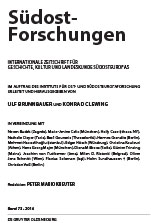Die Internationale Kontrollkommission Albaniens und die albanischen Machtzentren (1913/1914). Beitrag zur Geschichte der Staatsbildung Albaniens
The Albanian International Commission of Control and the Albanian power centres (1913/1914) – Contribution to the history of the state-building process in Albania
Author(s): Krisztián Csaplár-DegovicsSubject(s): Nationalism Studies, Pre-WW I & WW I (1900 -1919), Period(s) of Nation Building, Between Berlin Congress and WW I
Published by: De Gruyter Oldenbourg
Keywords: The International Commission of Control; Balkan Wars;
Summary/Abstract: The best guarantee of protecting the rights of Christian minorities on the European territory of the Ottoman Empire in the late 19th century was nothing else but the establishing of own nation-states, where the Christian population could lead his life without being ruled or controlled by the Ottoman Empire. This process found support and was assisted by the Great Powers. It means, that one form of the humanitarian intervention was the state-building instructed or assisted from abroad. One of the unexpected experiences of the Balkan Wars 1912/1913 was that the members of the Balkan League committed genocides and other kinds of mass violence against other Nationalities and the Muslim population of the peninsula. Among other things the Albanian state-building project of the Great Powers aimed to prevent further genocide and other acts of violence against the Albanian population and other refugees from Macedonia and to put an end to the anarchy of the country. Th e main international organisation to directly represent the great powers in the new Albania and to be responsible for the state-building process was the International Commission of Control.
Journal: Südost-Forschungen
- Issue Year: 2014
- Issue No: 73
- Page Range: 231-267
- Page Count: 37
- Language: German
- Content File-PDF

